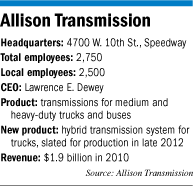Subscriber Benefit
As a subscriber you can listen to articles at work, in the car, or while you work out. Subscribe Now
 Indianapolis-based Allison Transmission will be a latecomer to the hybrid truck market, but that doesn’t mean the company has missed its opportunity.
Indianapolis-based Allison Transmission will be a latecomer to the hybrid truck market, but that doesn’t mean the company has missed its opportunity.
The industry is waiting for the magic combination of high fuel prices and government-backed incentives to turn potential into profit. Commercial hybrid trucks have been available for several years, but the number produced in 2010 was about 1,900—half of 1 percent of the total market.
Sandeep Kar, an analyst with California-based Frost & Sullivan, thinks that, by 2016, truck makers will produce 33,900 hybrids. That’s a much more enticing figure to Allison, which plans to roll out its hybrid transmission in late 2012.
“I believe Allison has a very strong potential,” said Kar, who is in Toronto. “I’m surprised Allison has not already entered the truck market.”
Allison already does a substantial business in the hybrid bus market, but it lags Ohio-based competitor Eaton Corp. in supplying medium- and heavy-duty trucks. In the prospectus for its planned $750 million initial public offering, Allison promotes its forthcoming hybrid system as a growth opportunity.
The company declined an interview request to discuss its hybrid plans because of the “quiet period” leading up to its IPO. In the prospectus, Allison said it expects “strong demand” for its truck system because of the same emphasis on fuel efficiency and emissions that’s driven the bus market. Allison saw $156 million, or 8 percent of its revenue, from sales to hybrid buses last year.
Allison hinted in the prospectus at competition with Eaton, saying its product would provide a “strong value proposition” compared with non-automatic transmissions. (Allison is the leading maker of fully automatic transmissions, while Eaton makes manual transmissions and an almost-automatic variety called “automated manual.”)
Hybrids make the most sense in the markets Allison dominates—work trucks with stop-and-go routes. The only problem is that upfront costs are enormous—$30,000 or so more than the conventional sticker price. Without a subsidy, it takes years to recover the cost through fuel savings.
The last federal tax credit for hybrid trucks, which ranged from $6,000 to $12,000, expired at the end of 2010, and nothing new is on the horizon.
“Unfortunately, for those of us in the commercial vehicle sector, there are no subsidies, which is going to be one of the challenges for the adoption rate for hybrids,” said Steve Tam, commercial trucking analyst with ACT Research in Columbus, Ind.
The glacial pace of hybrid sales is no surprise to Mark Fritcha, sales manager for medium-duty and hybrid trucks at Stoops Freightliner in Indianapolis.
The dealership offers a hybrid system, made by Eaton, that goes in all sorts of trucks, from beer distribution to package delivery, but it has just one steady customer, Duke Energy. The utility company buys eight to 10 trucks a year, he said.
Utility-company bucket trucks were an early outlet for hybrid technology because their hours-long idle times burn so much fuel.
With the power companies, Tam said, “It’s really a public relations and image-type thing.”
Frost & Sullivan’s Kar is bullish on hybrids, even without a federal subsidy. For some uses, such as garbage collection, fleet owners could recover their upfront premium in as short as three or four years, he said.
He predicts that new models will spark demand, which will in turn drive up volumes and push down costs. That’s why he’s looking forward to Allison’s entry to the market.
“Allison is a company that can truly challenge Eaton,” he said.
Allison says its system will improve fuel efficiency 25 percent to 35 percent, depending on the truck. Its initial target users are delivery trucks, shuttle buses, garbage trucks and utility trucks.
There’s no national standard for emissions or fuel economy in commercial trucks, but that might change.
The Environmental Protection Agency and National Highway Traffic Safety Administration have proposed rules that would be in place for 2014 models.
Despite the huge step in fuel efficiency that Allison and its competitors offer, trucks and buses still post “pathetic” miles-per-gallon figures, Tam said. City buses travel on about 4 miles per gallon, while over-the-road trucks get about 6 miles per gallon, he said.
Those numbers also mean that commercial trucks burn thousands of gallons of diesel a year.
Kar thinks the cost of diesel—currently more than $4 per gallon—ultimately will drive the hybrid truck market.
“All of these trucks at the end of the day run on fuel,” he said.•
Please enable JavaScript to view this content.
